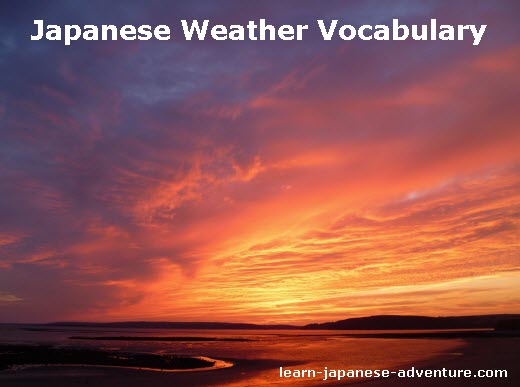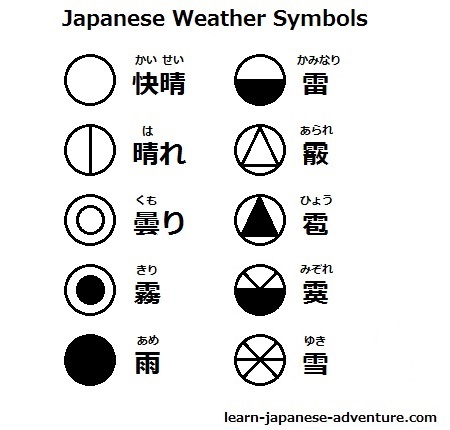- Home
- Japanese Vocabulary
- Japanese Weather
Japanese Weather
Words and Vocabulary
This section covers the words and vocabulary used to describe Japanese weather and seasons.


Japan is an island country and hence is frequently affected by bad weather. Especially when strong and powerful typhoons hit the country, most areas will be affected.
Therefore many words are used to describe different weathers.
Besides, Japan has four seasons. Thus, various words are created to sketch the images of the different seasons.
Japanese people pay attention to the news for weather forecasts all the time.
Pick up the words used and next time you will know what is the Japanese weathercaster talking about in the news.
Some symbols used to represent the Japanese weather are shown in the figure above.
| Kanji | Hiragana or Katakana |
Romaji | Meaning | |
| 1. | 天気 | てんき | tenki | Weather |
| 2. | 天気予報 | てんきよほう | tenki yohou | Weather Forecast |
| 3. | 晴れ | はれ | hare | Clear Weather / Fair Weather |
| 4. | 快晴 | かいせい | kaisei | Fine Weather / Clear and Sunny |
| 5. | 太陽 | たいよう | taiyou | Sun |
| 6. | 曇り | くもり | kumori | Cloudy Weather |
| 7. | 雲 | くも | kumo | Cloud |
| 8. | 雪 | ゆき | yuki | Snow |
| 9. | 大雪 | おおゆき | ooyuki | Heavy Snow |
| 10. | 霰 | あられ | arare | hailstone / Falling Iceball |
| 11. | 雹 | ひょう | hyou | hail |
| 12. | 霙 | みぞれ | mizore | Sleet / Snow with Rain |
| 13. | 雷 | かみなり | kaminari | Thunder |
| 14. | 雨 | あめ | ame | Rain |
| 15. | 霧雨 | きりさめ | kiri same | Misty Rain / Light Drizzle |
| 16. | 小雨 | こさめ | kosame | Light Rain / Drizzle |
| 17. | 俄雨 | にわかあめ | niwaka ame | Rain Shower / Sudden Shower |
| 18. | 大雨 | おおあめ | ooame | Heavy Rain |
| 19. | 豪雨 | ごうう | gouu | Downpour |
| 20. | 暴風雨 | ぼうふうう | boufuuu | Rainstorm |
| 21. | 雷雨 | らいう | raiu | Thunderstorm |
| 22. | 通り雨 | とおりあめ | toori ame | Passing Shower |
| 23. | 天気雨 | てんきあめ | tenki ame | Sun Shower / Sudden Rainfall in the Sunshine |
| 24. | 春雨 | しゅんう / はるさめ | shunu / haru same | Spring Rain |
| 25. | 酸性雨 | さんせいう | sanseiu | Acid Rain |
| 26. | 局地的な雨 | きょくちてきなあめ | kyoku chi teki na ame | Regional Rain |
| 27. | 梅雨 | つゆ / ばいう | tsuyu / baiu | Rainy Season |
| 28. | 雨季 | うき | uki | Rainy Season |
| 29. | 乾季 | かんき | kanki | Dry Season |
| 30. | 霧 | きり | kiri | Fog / Mist |
| 31. | 濃霧 | のうむ | noumu | Heavy Fog / Dense Mist |
| 32. | 風 | かぜ | kaze | Wind / Breeze |
| 33. | 強風 | きょうふう | kyoufuu | Strong Wind |
| 34. | 暴風 | ぼうふう | boufuu | Windstorm |
| 35. | 台風 | たいふう | taifuu | Typhoon |
| 36. | 海風 | うみかぜ / かいふう | umikaze / kaifuu | Sea Breeze |
| 37. | 陸風 | りくふう | rikufuu | Land Breeze |
| 38. | 季節風 | きせつふう | kisetsu fuu | Monsoon / Seasonal Wind |
| 39. | 旋風 | せんぷう / つむじかぜ | senpuu / tsumuji kaze | Whirlwind / Vortex |
| 40. | 乾燥 | かんそう | kansou | Dryness |
| 41. | 湿気 | しっけ | shikke | Moisture / Humidity / Damp |
| 42. | 湿度 | しつど | shitsu do | Level of Humidity |
| 43. | 気温 | きおん | kion | Temperature |
| 44. | 最低気温 | さいていきおん | saitei kion | Minimum Temperature |
| 45. | 最高気温 | さいこうきおん | saikou kion | Maximum Temperature |
| 46. | 気圧 | きあつ | kiatsu | Atmospheric Pressure |
| 47. | 低気圧 | ていきあつ | tei kiatsu | Low Atmospheric Pressure |
| 48. | 高気圧 | こうきあつ | kou kiatsu | High Atmospheric Pressure |
| 49. | 前線 | ぜんせん | zensen | Weather Front |
| 50. | 洪水 | こうずい | kouzui | Flood |
| 51. | 波浪 | はろう | harou | Ocean Waves |
| 52. | 津波 | つなみ | tsunami | Tsunami / Tidal Wave |
| 53. | 地震 | じしん | jishin | Earthquake |
| 54. | 震度 | しんど | shindo | Japanese Earthquake Scale |
| 55. | 震源 | しんげん | shingen | Earthquake Center / Seismic Center |
| 56. | 季節 | きせつ | kisetsu | Season |
| 57. | 四季 | しき | shiki | Four Seasons |
| 58. | 春 | はる | haru | Spring |
| 59. | 夏 | なつ | natsu | Summer |
| 60. | 秋 | あき | aki | Autumn / Fall |
| 61. | 冬 | ふゆ | fuyu | Winter |
| 62. | 真夏日 | まなつび | ma natsu bi | Tropical Day |
| 63. | 真冬日 | まふゆび | ma fuyu bi | Ice Day |
| 64. | 虹 | にじ | niji | Rainbow |
This Japanese weather vocabulary list contains some terms which might not be used in normal conversations.
But if you keep listen to the Japanese weather forecasts for a while, you will soon understand most of them.
And if you are hungry for more words related to weather in Japanese, how to pronounce them correctly, and also looking for example sentences using them, make sure you check out this page on more vocabulary on weather.
By the way, this link above is an affiliate link, which means that I would earn a commission if you do end up purchasing the related learning course. It's at no extra cost to you, and please if you have any questions related to this learning course, please let me know and I would be happy to answer them for you.
Buy me a coffee








Facebook Comments
Don’t see the comments box? Log in to your Facebook account, give Facebook consent, then return to this page and refresh it.